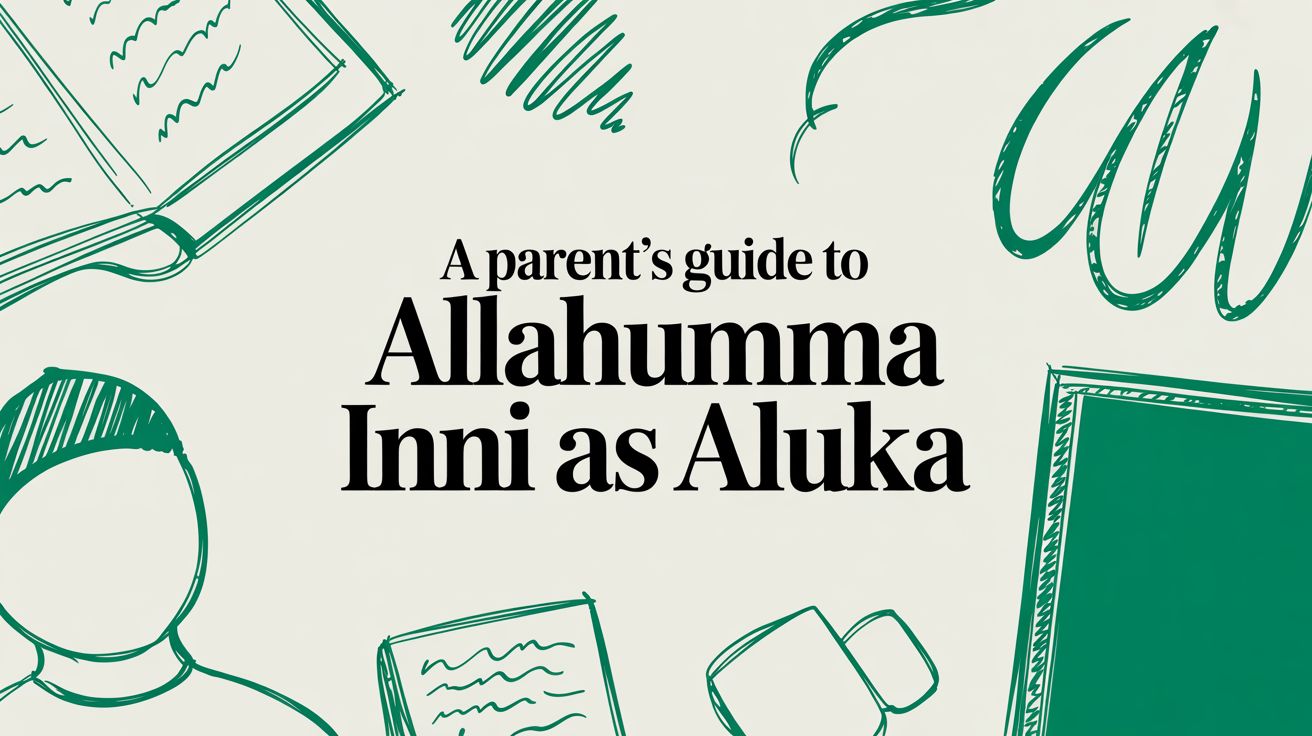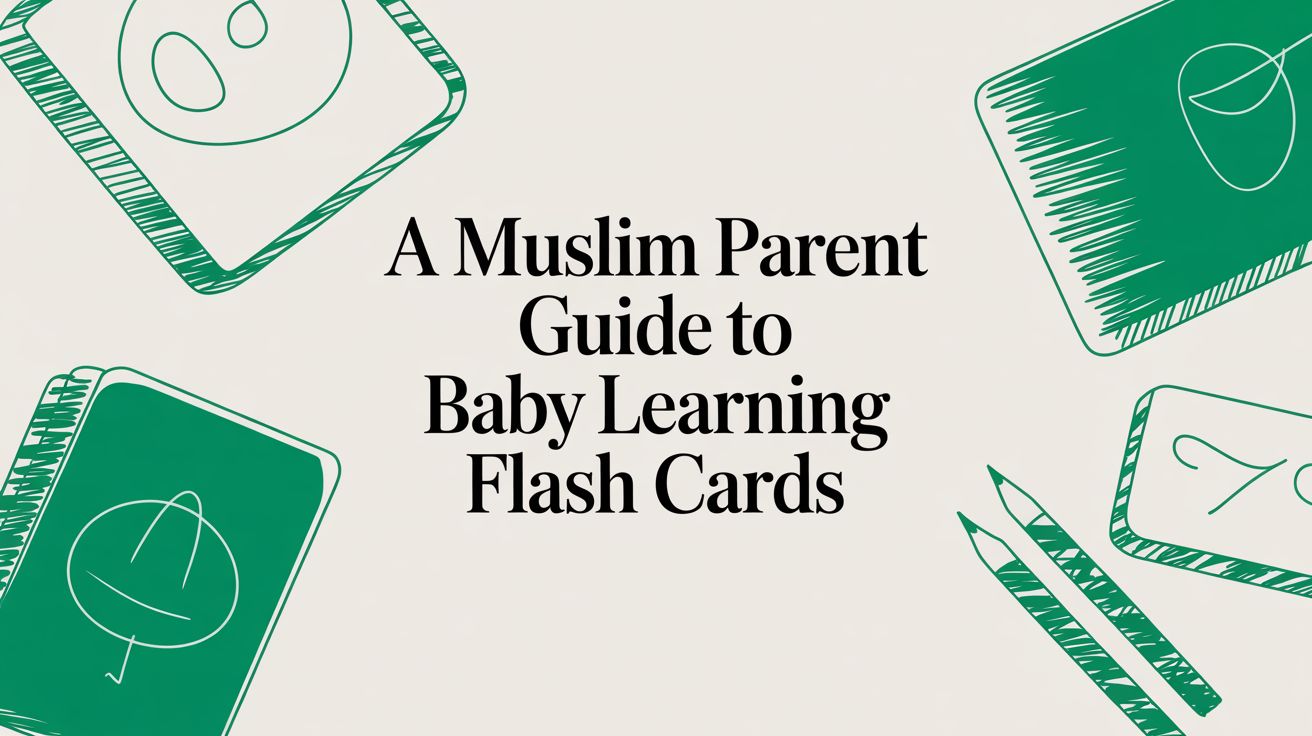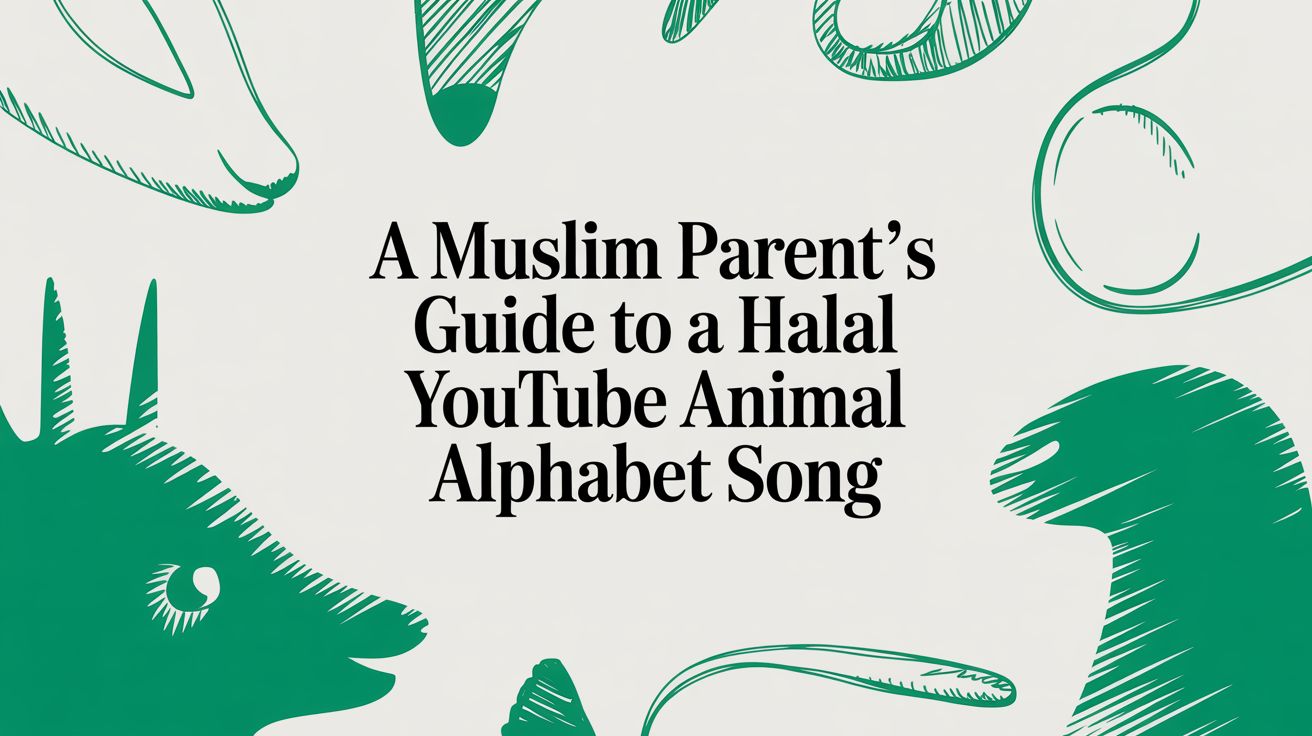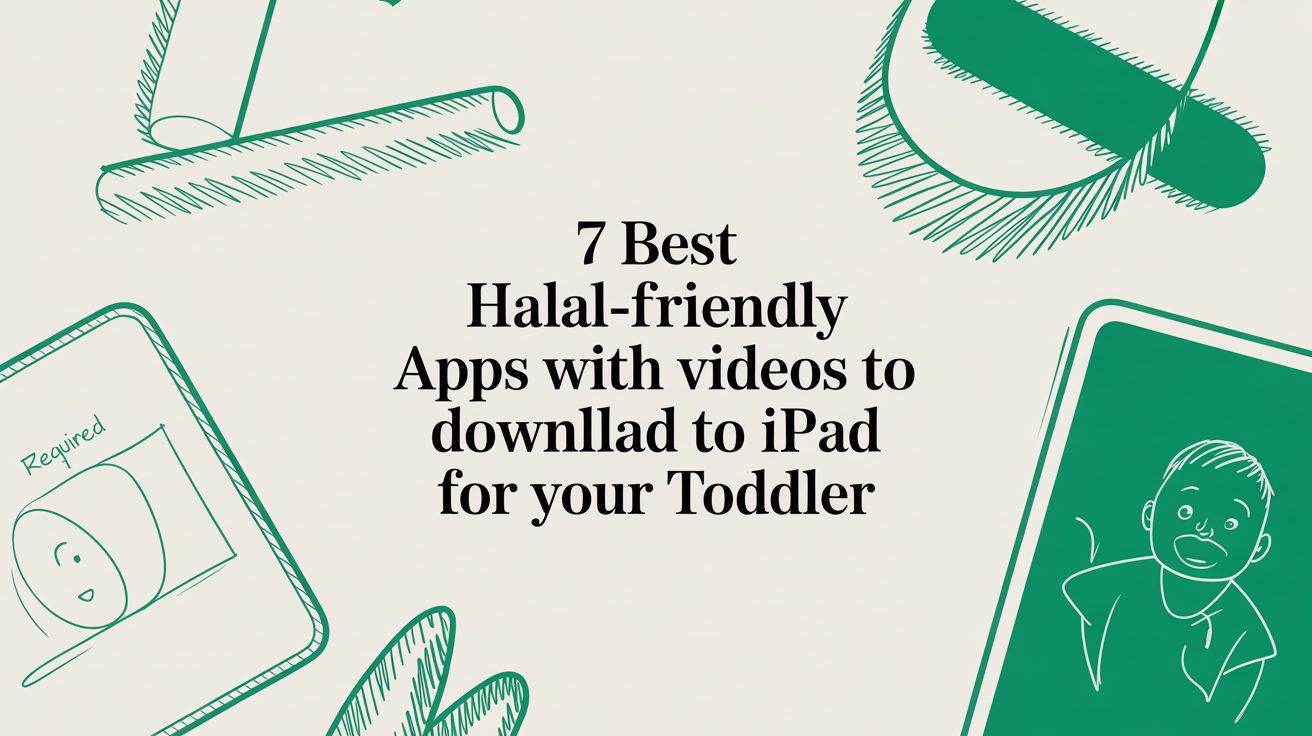As Muslim parents, we get so excited about our little one's firsts—that first gummy smile, the first time they say "mama," their first wobbly steps. But what about fostering the most important connection of all? The beautiful phrase Allahumma inni as aluka (O Allah, I ask of You) is the perfect, gentle way to begin your family's lifelong conversation with Allah.
Your Gentle Introduction to a Lifelong Conversation
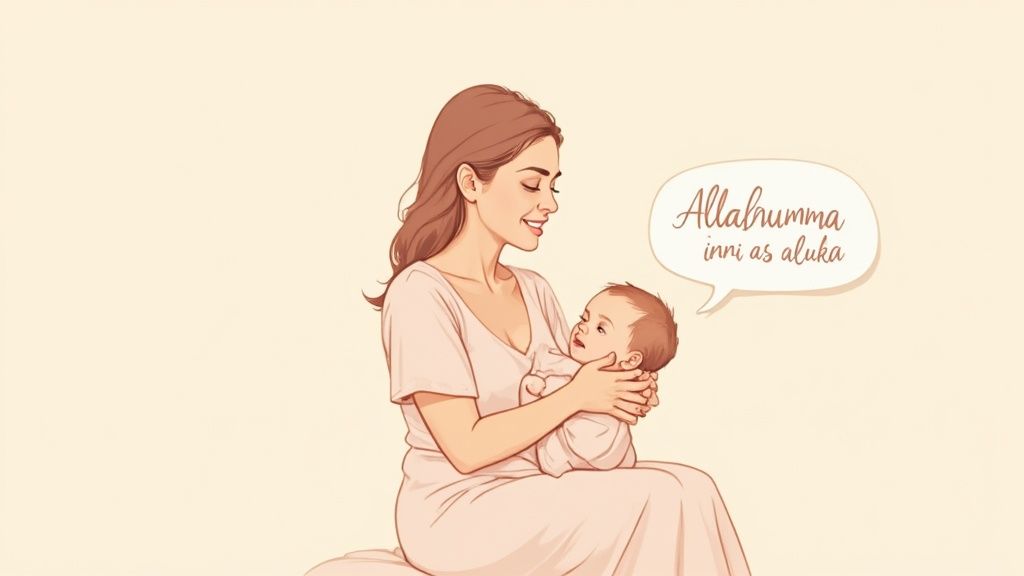
Think about those quiet moments of parenthood—rocking your baby to sleep before Fajr, watching your toddler marvel at a ladybug in the garden. Your heart is already overflowing with prayers for them. You want them to be safe, healthy, and happy. You pray for a life filled with goodness and strong faith.
The simple phrase "Allahumma inni as aluka" is the key that unlocks all those unspoken wishes. It's more than just a few Arabic words; it's the most natural starting point for talking directly to our Creator. It’s like teaching your child to say, "Dear God..." before they ask for anything.
A Dua for Every Stage
From the moment your baby comes home, this dua can become a soothing, familiar sound. Whispering it during a late-night feeding or reciting it while cuddling your toddler fills your home with a peaceful, warm feeling. It shows them, through your own actions, that turning to Allah is a source of immense comfort and love.
The real power of this phrase is in its beautiful simplicity. It plants a fundamental truth in our children’s hearts from the very beginning: Allah is the One we turn to for everything we could ever need or want.
For a child aged 0–3, this isn't about memorization. It’s about association. When your little one hears "Allahumma inni as aluka" during moments of love and care, they start to connect the act of dua with feelings of security, warmth, and a bond with something greater than themselves.
Building a Foundation of Trust
As your child grows, this foundational phrase becomes the doorway to more specific prayers. It’s the opening line of a conversation that will, insha'Allah, continue for the rest of their lives, framing their entire worldview in a positive light.
- It builds reliance: They learn that for every need, big or small, the very first step is to ask Allah.
- It nurtures gratitude: It naturally leads to thanking Allah for all His countless blessings.
- It creates a bond: It strengthens their personal, unique relationship with their Creator.
By weaving "Allahumma inni as aluka" into your family's daily life, you're giving your child one of the most precious gifts imaginable. You're planting a seed of faith that will grow right alongside them, offering strength and comfort for years to come. It’s a simple start to a beautiful spiritual journey you get to begin together, right from day one.
Understanding the Heart of This Beautiful Dua
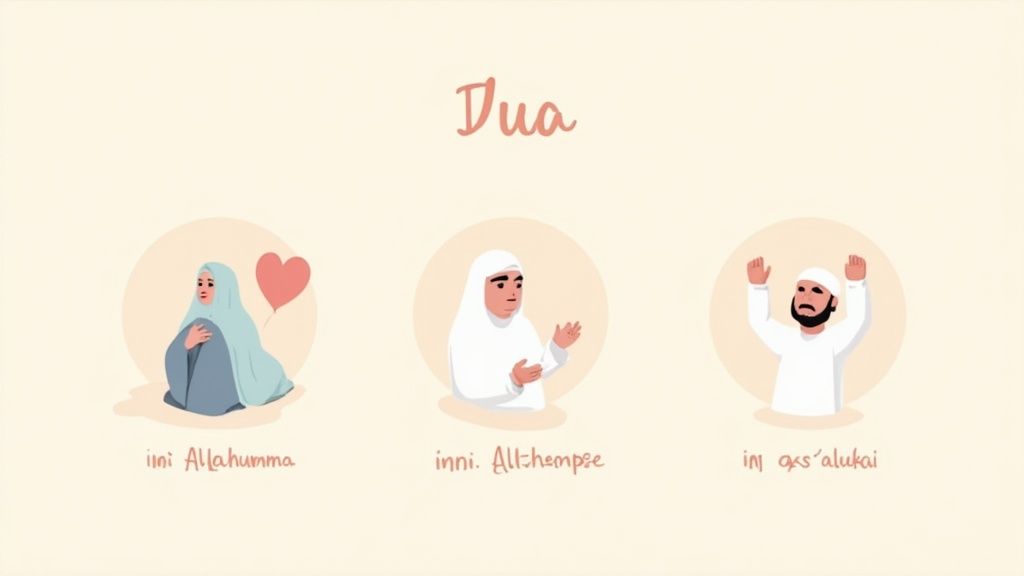
At its very core, "Allahumma inni as aluka" is one of the most natural, heartfelt ways to speak to Allah. It feels like a child turning confidently to a loving parent, knowing they won’t just be heard but welcomed with warmth. Let's gently unpack each part of this powerful phrase to see why it’s so perfect for our families.
You can think of it as a three-part knock on the door of Allah's mercy. Each word is filled with its own unique beauty and respect, creating the perfect opening to any prayer you want to make for yourself, your child, or your family.
Allahumma: A Personal Call to Allah
The first word, Allahumma, is a beautiful and intimate way of saying, "O Allah." It’s so much more than just calling out a name; it feels personal, direct, and full of love. This single word establishes a one-on-one connection right from the start.
When we say "Allahumma," it’s like we’re whispering directly to the One who knows every hope in our hearts, especially the ones we hold for our little ones. It immediately sets a tone of sincerity and closeness.
Inni: Acknowledging Our Humble Place
Next, we have inni, which simply means "indeed I" or "truly, it is I." This small word carries a great deal of humility. It’s our way of presenting ourselves before Allah, recognizing our smallness in the face of His greatness.
By saying "inni," we're being vulnerable and sincere. We're admitting that we are the ones in need, the ones asking. For any parent, this is such a powerful sentiment. It’s an admission that while we do everything we can for our children, we ultimately rely on Allah's help and guidance for their well-being.
This beautiful balance of confidence and humility is what makes the dua so powerful. We approach with the confidence of "Allahumma" (knowing He will listen) and the humility of "inni" (knowing we are entirely dependent on Him).
As’aluka: The Gentle Act of Asking
Finally, the phrase wraps up with as’aluka, which means "I ask of You." This is the action part of the dua—the moment we voice our need. It’s a direct, clear, and respectful request made to the only One who can truly grant it.
The beauty of "as’aluka" is that it can be followed by literally anything. You can ask for your baby’s health, for patience during a tough toddler tantrum, for guidance in raising a righteous child, or for peace in your home. It’s the universal key that opens the door to every possible request.
The phrase "Allahumma inni as'aluka" is one of the most frequently recited openings for supplication in the entire Islamic tradition. It's estimated that over 1.8 billion Muslims worldwide incorporate this invocation, or a variation of it, into their daily prayers and personal du'as. Its place in a believer's life is profound, as you can see from the sheer diversity of invocations recited during prayer.
How to Say It with Confidence
Making this dua a familiar sound in your home is a beautiful goal. Here’s a simple guide to help you pronounce it clearly and confidently, so its recitation becomes second nature, even on the busiest of days.
- Transliteration: Al-laa-hum-ma in-nee as-a-lu-ka
- A-lla-hum-ma: The 'a' is short, like in 'apple'. The 'llah' is said with your tongue touching the top of your mouth, just like the name 'Allah'. The 'hum' is like the word 'hum', and 'ma' sounds like the 'ma' in 'mama'.
- In-nee: The 'i' is short, like in 'pin', followed by a long 'ee' sound, just like in the word 'need'.
- As-a-lu-ka: 'As' is like the start of the word 'ask'. The 'a' and 'u' are short sounds ('ah' and 'oo' as in 'book'), and 'ka' is like the 'ca' in 'cat'.
Reciting these words, even in a soft whisper while your baby sleeps, fills your space with blessings and models a beautiful, lifelong habit of turning to Allah for everything.
The Most Powerful Duas for Your Family's Future
Once you’re familiar with the beautiful opening, "Allahumma inni as aluka," you start to see it as a key. This simple, heartfelt beginning unlocks some of the most profound prayers taught to us by Prophet Muhammad (peace be upon him). It’s the perfect foundation for asking Allah for everything you could ever want for your family.
Think of it this way: "O Allah, I ask of You..." is the start of your sentence. What comes next are the specific hopes and dreams you hold for your little ones—not just for today, but for their entire lives and the Hereafter. These prophetic supplications are so powerful because they cover every angle of a good, righteous life.
Let's look at a few of these beautiful duas. They're simple enough to whisper over your sleeping baby, yet deep enough to carry your family through life's biggest moments.
Asking for a Blessed Foundation
One of the most well-known and beloved duas combines three essential requests for a righteous and successful life. It's a short, rhythmic prayer that's easy to remember, even on a hectic day with a toddler. The Prophet (peace be upon him) recited it often, especially after the Fajr prayer.
The dua is:
Allahumma inni as aluka 'ilman nafi'an, wa rizqan tayyiban, wa 'amalan mutaqabbalan.
So, what are you really asking for your child here? Let's break it down:
'Ilman nafi'an (Beneficial Knowledge): This is a prayer for your child to learn things that bring them closer to Allah and genuinely help them in life. It’s about so much more than school; it's about wisdom, good judgment, and a heart that understands the world through the lens of faith.
Rizqan tayyiban (Pure Provision): Here, you're asking Allah to provide for your family from pure, wholesome, and halal sources. This covers everything—from the food your baby eats to the home you live in—asking for blessings and purity in all of it.
'Amalan mutaqabbalan (Accepted Deeds): This is such a beautiful request for Allah to accept all the good you do. Every diaper change done with patience, every meal prepared with love, every effort to raise a good Muslim. It's a prayer that your actions have meaning and are rewarded by Him.
This single, comprehensive dua touches on the pillars of a good life: a sound mind, a healthy body, and a pure soul.
The Ultimate Requests for This Life and the Next
As parents, our deepest hope is for our children's ultimate success—a life that leads them straight to Jannah. The Prophet Muhammad (peace be upon him) taught us to be direct and ask for exactly that. These next duas are simple, powerful, and get right to the heart of what every Muslim parent truly wants.
Consider these two foundational requests:
- Allahumma inni as'alukal-jannah. (O Allah, I ask You for Paradise.)
- Allahumma inni a'udhu bika minan-nar. (O Allah, I seek refuge in You from the Fire.)
Honestly, is there anything more important you could ask for? Reciting these duas for your children is a constant, powerful reminder of your ultimate goal as a parent: to raise them in a way that pleases Allah and earns them a place in His eternal garden. It’s a prayer that wraps up all other good deeds and intentions into one ultimate ask.
The sheer importance of the "Allahumma inni as'aluka" tradition is clear from the teachings transmitted through Aisha (may Allah be pleased with her). Islamic scholars have noted that this specific supplication has been included in over 95% of classical Islamic jurisprudential texts and hadith collections since the 8th century CE. It’s a cornerstone of our faith. You can learn more about the significance of such prophetic duas for Jannah and their beautiful place in our tradition.
By making these duas a regular part of your day—maybe after your prayers or during a quiet moment with your child—you are planting the most important seeds for your family's future. It’s just like making a special dua when breaking your fast; you can learn more about specific supplications in our guide on the dua for breaking your fast to enrich your spiritual toolkit. These prophetic words are a gift, giving us the perfect language to express the deepest prayers we hold in our hearts for our children.
Beautiful 'Allahumma Inni As Aluka' Duas for Your Family
To make it even easier, here's a quick reference guide to some common and incredibly beneficial duas that start with this powerful phrase. You'll find the transliteration, the full meaning, and a suggestion for when you might use them.
| Dua Continuation (Transliteration) | Full Meaning in English | A Good Time to Recite It |
|---|---|---|
| 'ilman nafi'an, wa rizqan tayyiban, wa 'amalan mutaqabbalan | beneficial knowledge, pure provision, and accepted deeds | After Fajr prayer, or as a daily morning dua for your family's day. |
| al-jannah | Paradise | After every prayer, or when you feel a deep sense of gratitude and hope. |
| khayra hadhal-yawmi: Fathahu wa nasrahu wa nurahu wa barakatahu wa hudah | the good of this day: its victory, its help, its light, its blessings, and its guidance | In the morning, as you and your children start a new day. |
| al-'afwa wal-'afiyah fid-dunya wal-akhirah | pardon and well-being in this world and the Hereafter | During times of difficulty, illness, or when seeking peace of mind. |
| al-huda wat-tuqa wal-'afafa wal-ghina | guidance, piety, chastity, and self-sufficiency | When making decisions or praying for your child's character development. |
Hopefully, this table gives you a wonderful starting point for incorporating these powerful words into your family's daily life, turning simple moments into acts of worship and connection with Allah.
Weaving Dua into Your Toddler's Daily Rhythm
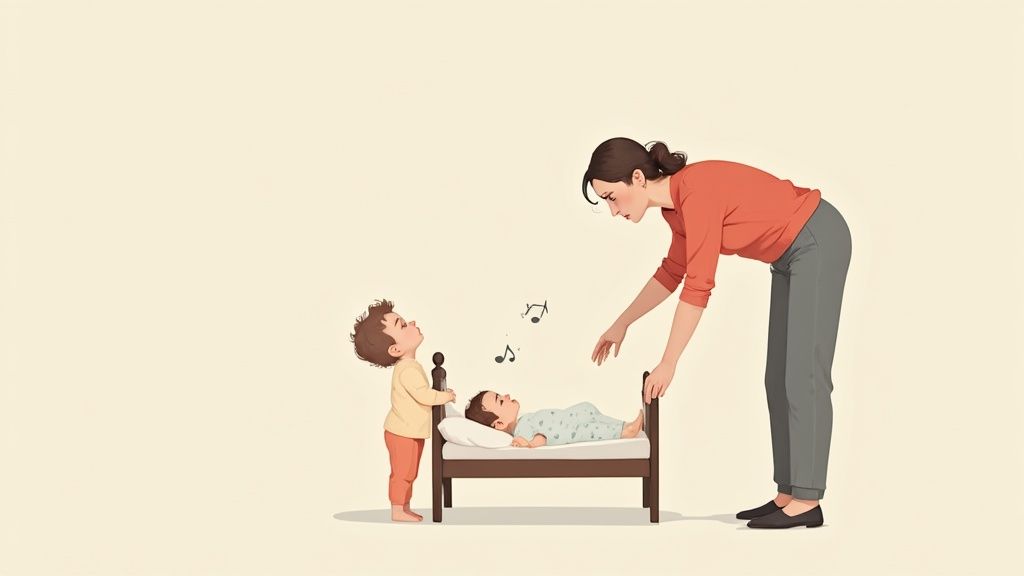
Trying to teach dua to a child who's still mastering "mama" or "dada" might feel like a huge leap. But honestly, at this tender age, it’s not about memorizing complex phrases. It's about creating a feeling—a warm, safe, and positive connection to the simple act of turning to Allah.
Think of "Allahumma inni as aluka" as a soothing, familiar sound. Your goal is to make dua a natural, comforting part of their world, just like a bedtime story or a warm hug. It's about connecting this beautiful conversation with moments of love, calm, and security.
Start with the Senses
For babies and toddlers, the whole world is a sensory experience. They learn through what they see, hear, and feel. So, instead of treating dua like a formal lesson, think of it as a loving interaction that gently engages their senses.
Your voice is your most powerful tool. A soft, melodic tone is far more impactful than a stern, instructional one. When you recite "Allahumma inni as aluka," let it be a calming whisper during a diaper change or a gentle hum while rocking them to sleep. This consistency builds a comforting audio cue they'll start to associate with peace and your loving presence.
Finding Natural Moments for Dua
The easiest way to make dua a habit is to attach it to things you already do every single day. Trying to carve out a new "dua time" with a fidgety toddler is a recipe for frustration. Instead, look for those small, quiet pockets in your day where you can seamlessly introduce it.
Here are a few simple ideas to get you started:
- During Feeding Times: As you settle down to feed your baby or give your toddler a snack, softly recite the dua. It turns a routine moment into a blessed one.
- At Bedtime and Naptime: The moments before sleep are often calm and cuddly. Whispering a short dua into their ear as they drift off is a beautiful way to close their day.
- When Seeing Something Beautiful: Out on a walk, when you spot a vibrant flower or the bright moon, you can raise your hands for a second and say, "Allahumma, thank you for the pretty flower!" This connects dua to gratitude and the wonders of Allah's creation.
- Before Leaving the House: As you buckle your little one into their car seat, you can make a quick dua for a safe journey. This models the habit of seeking Allah's protection in everything you do.
The key is consistency, not duration. A heartfelt, five-second dua repeated throughout the day is far more meaningful for a young child than a five-minute session that feels forced. They absorb the emotion and intention behind your words far more than the words themselves.
Gentle Actions and Playful Rhymes
Toddlers are natural mimics. You can introduce the physical gesture of dua long before they can form the words. Gently bring their little hands together, raise them up, and smile as you say the words. This physical connection makes the concept more real and fun for them.
You can also turn the phrase into a simple, melodic rhyme. Children between the ages of 0–3 respond wonderfully to rhythm and song. You don't need to be a poet; something as simple as this works wonders:
"Little hands up, what do we do?
Allahumma, we ask from You!"
This playful approach takes away any pressure and makes dua feel joyful and engaging. It becomes a special game between you, building positive memories around this beautiful act of worship.
The Power of Your Own Example
Ultimately, the most profound lesson your child will ever learn about dua comes from watching you. When they see you raise your hands in gratitude after a good meal, or hear you make a quiet dua after your salah, they are absorbing a powerful truth without you saying a word.
They are learning that talking to Allah is a normal, natural, and essential part of life. They see that their parent—their source of safety and love—turns to Allah for everything. This passive learning is incredibly formative and lays a foundation of reliance on Allah that will, insha'Allah, stay with them for life. Your own consistent practice is the greatest lesson of all, teaching them that with "Allahumma inni as aluka," they always have a direct line to the source of all comfort and strength.
Playful Activities That Nurture a Love for Dua
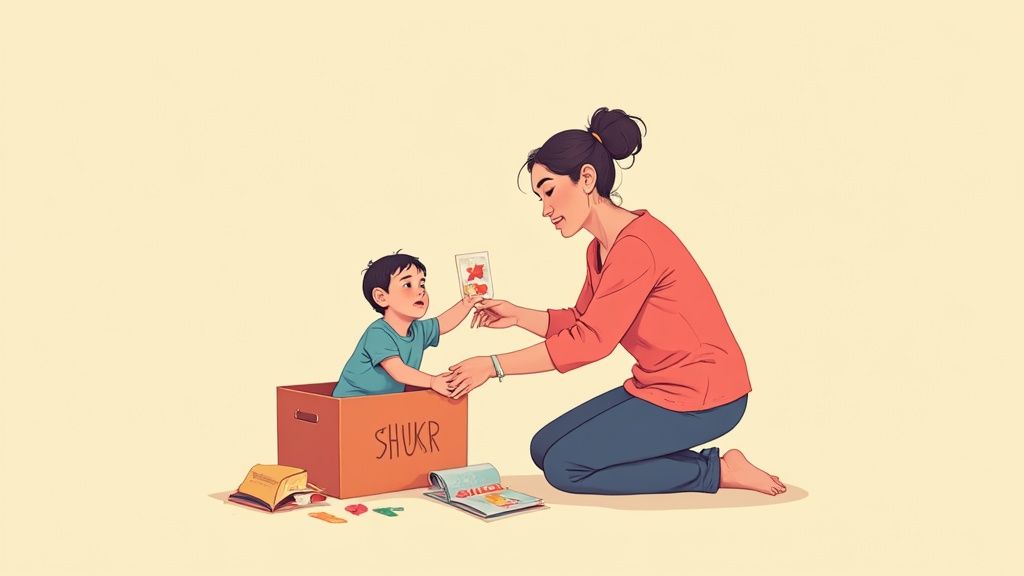
For our little ones, the world is a giant playground of discovery. Abstract ideas like praying or asking Allah for something only click when they’re tied to real, joyful experiences. The goal isn't to hold a formal lesson; it’s about weaving the beauty of dua into playtime, building a foundation of love that feels as natural as a hug.
These activities are designed to be simple, sensory-rich, and perfect for tiny attention spans. They connect the act of making dua with feelings of safety, love, and Allah's boundless blessings, making "Allahumma inni as aluka" a happy, familiar phrase.
Create a Shukr (Gratitude) Box
A simple shoebox can become one of the most powerful tools for teaching gratitude. This activity helps your toddler physically connect the dots between Allah's blessings and the act of saying "Alhamdulillah" or making a small dua.
The idea is wonderfully simple. Decorate an empty box together and call it the "Shukr Box." Then, you can start filling it with little things that represent Allah's gifts.
For Babies: Use items with different textures, like a soft piece of fabric (for warm clothes) or a smooth stone (from a walk outside). As you put each item in, you can say, "Alhamdulillah for our warm blankets. O Allah, thank you."
For Toddlers: Let them take the lead. Ask, "What is something yummy Allah gave us today?" If they say "banana," you can draw a little banana together to put in the box. This builds their vocabulary and lets them be part of the process.
This hands-on activity makes the big concept of gratitude something they can literally hold. Opening the box every few days to look at the items is a beautiful way to create a family ritual of remembrance.
Point-and-Say Dua with Picture Books
Story time is the perfect, cozy moment to gently introduce Allah as the Creator. There are many beautiful Islamic board books out there, but honestly, you can use any picture book that shows nature, animals, or food.
As you turn the pages, just point to the beautiful things you see and connect them back to Allah.
- Point it out: "Wow, look at that big, bright sun! SubhanAllah."
- Name the Giver: "Allah made the sun to keep us warm."
- Make a quick dua: Just for a second, raise your hands and say, "Allahumma, thank you for the sunshine."
This simple three-step process doesn't interrupt the flow of the story but adds a layer of beautiful meaning. It teaches your child to see the world as a collection of Allah's miracles and to respond with gratitude.
This isn't about getting them to repeat words. It's about you modeling a heartfelt response. When your toddler sees you react to a picture of a flower with a spontaneous, happy dua, they learn that talking to Allah is a joyful, natural part of life.
Make and Trace Colorful Dua Hands
Toddlers love arts and crafts, especially when it involves their own hands! This activity creates a sweet visual reminder of dua that you can hang up in their room or your family prayer space.
All you need is some colorful paper, a pencil, and child-safe scissors.
- Trace your toddler's hand on a piece of paper and cut it out.
- Trace your own hand on a different color and do the same.
- Glue the smaller hand onto the larger one, positioning them like hands raised in prayer.
While you're doing this, you can chat in simple terms about what you're making. "These are our dua hands! We use them to ask Allah for nice things, like yummy snacks and cozy cuddles." This makes the abstract idea of raising your hands for dua a physical, memorable experience they helped create.
Finding Trustworthy Islamic Resources for Your Little One
Navigating the world of children’s content can feel overwhelming. As a parent, you’re trying to find things that are not just safe and gentle, but also align with your family’s Islamic values. It’s a real challenge to find high-quality, age-appropriate materials for babies and toddlers that help you build that rich Islamic environment you want at home.
Thankfully, there are some truly wonderful resources out there made just for little Muslims. They can help you create a peaceful, beautiful atmosphere that nurtures your child’s fitra (their natural, pure disposition).
Gentle Sounds for Little Ears
For the tiniest tots, especially those aged 0–3, audio is incredibly powerful. A baby’s brain is like a sponge for language and rhythm, which makes gentle nasheeds and Quran recitation a perfect way to introduce them to the sounds of our faith.
Soothing Nasheeds: Look for songs without musical instruments that have simple, sweet lyrics about Allah’s love, being thankful, or basic duas. These are great to have on softly during playtime or even on car rides.
Quran Recitation: Simply having the Quran playing quietly in the background is one of the most beautiful ways to fill your home with blessings. Try to find reciters with a soft, melodic voice to create a calm and serene atmosphere that even the youngest babies can feel.
Board Books and Safe Screen Time
What our little ones see is just as important as what they hear. Sturdy board books with vibrant, simple pictures of Allah's creations—like animals, the sun, and the moon—can spark the very first conversations about the Creator.
And let’s be realistic, screen time is a part of modern parenting. The good news is that digital Islamic content has come a long way. Developers reported around 340 million downloads of Quranic and dua apps between 2019 and 2024, and apps focused on supplication made up 34% of that market. It's clear that families are actively looking for these tools.
When you're picking out apps or shows, try to prioritize content that's ad-free and created by Muslims who understand what it means to raise a child in a faith-based home. The right content can be a fantastic tool for gently reinforcing Islamic concepts.
It's all about finding a healthy balance. If you need some help navigating that, our guide on finding safe and appropriate Islamic content on YouTube Kids has practical tips to make screen time more meaningful.
By carefully choosing these resources, you can confidently build a nurturing environment that supports your child's spiritual journey, right from the very beginning.
Common Questions from Muslim Parents
It’s completely natural to have questions as you begin sharing the beauty of dua with your little one. Let’s walk through some of the most common thoughts and worries parents have, hopefully offering some comfort and practical advice as you plant these first, precious seeds of faith.
At What Age Can I Start Teaching My Child Dua?
Honestly? You can start from day one. For a newborn, it’s not about them understanding the words, but about them hearing the gentle sound of your voice. When you whisper "Allahumma inni as aluka" while cuddling them or rocking them to sleep, they begin to connect that beautiful sound with warmth, love, and safety.
As they grow into toddlers, you can invite them to mimic the simple act of raising their hands for dua. The goal isn't perfect recitation; it’s about creating a positive and loving early connection to the idea of talking to Allah.
My Toddler Is So Fidgety. How Can I Keep Them Engaged?
Welcome to toddlerhood! Their wiggles are a sign of healthy development. The trick is to keep it incredibly short, simple, and woven right into your daily routine.
Forget about setting a formal "dua time." Instead, try a quick, heartfelt whisper before a snack: "Allahumma, thank you for this yummy banana!" Just a few seconds is all it takes. Using a soft, melodic tone can also help capture their attention for that brief, special moment.
The most important lesson at this age isn't recitation, but association. Your child is learning that turning to Allah is a source of comfort, gratitude, and love—a feeling they will carry with them long before they can articulate the words themselves.
What if I Am Still Learning Duas Myself?
That is more than okay—it’s a beautiful thing for your child to witness. Your effort and desire to learn sets a powerful example. The phrase "Allahumma inni as aluka" is a complete and perfect place to start.
The real lesson you’re teaching is the habit of turning to Allah for everything, big or small. Starting with this single, foundational phrase is more than enough. Your sincerity and intention are what truly matter as you and your child grow together on this blessed journey.
At Babymode, we create gentle, ad-free screen time that aligns with your family's values. Discover a world of Quranic stories, nasheeds, and duas designed for curious Muslim toddlers aged 0–3.
